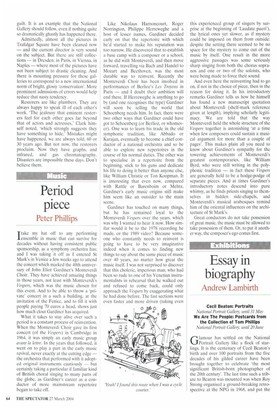Period piece
Peter Phillips
Itake my hat off to any performing ensemble in music that can survive for decades without having consistent public sponsorship, as a symphony orchestra has; and I was taking it off as I entered St Mark's in Venice a few weeks ago to attend the concert which marked the 40th anniversary of John Eliot Gardiner's Monteverdi Choir. They have achieved amazing things in those years, not least with Monteverdi's Vespers, which was the music chosen for this event. And to be able to throw a 'private' concert in a such a building, at the invitation of the Fenice, and to fill it with people paying 70 euros a head, shows just how much clout Gardiner has acquired.
What it takes to stay alive over such a period is a constant process of reinvention. When the Monteverdi Choir gave its first concert (of the Vespers) in Cambridge in 1964, it was simply an early music group avant la lettre. In the years that followed, it went on to play a part in the early music revival, never exactly at the cutting edge — the orchestra that performed with it adopted original instruments cautiously — but certainly taking a particular if familiar kind of British choral singing to many parts of the globe. as Gardiner's career as a conductor of more mainstream repertoire began to take off.
Like Nikolaus Harnoncourt, Roger Norrington, Philippe Herreweghe and a host of lesser names, Gardiner decided early on that the repertoire with which he'd started to make his reputation was too narrow. He discovered that to establish a base camp with a composer or a school, as he did with Monteverdi, and then move forward, travelling via Bach and Handel to Mozart and Beethoven, was the most durable way to reinvent. Recently the Monteverdi Choir has been involved in performances of Berlioz's Les Troyens in Paris — and I doubt their ambition will end there. If Herreweghe is anything to go by (and one recognises the type) Gardiner will soon be telling the world that Schoenberg needs him. In fact, there were two other ways that Gardiner could have got to Schoenberg (or Berlioz, or whomever). One was to learn his trade in the old symphonic tradition, like Abbado or Karajan, eventually to become a chief conductor of a national orchestra and so be able to explore new repertoires in the course of his normal duties. The other was to specialise in a repertoire from the beginning, stick to his guns and dedicate his life to doing it better than anyone else, like William Christie or Ton Koopman. It is interesting that even now, compared with Rattle or Barenboim or Mehta, Gardiner's early music origins still make him seem like an outsider to the main scene.
Gardiner has touched on many things, but he has remained loyal to the Monteverdi Vespers over the years, which was why I wanted to hear it now. How similar would it be to the 1978 recording he made, or the 1989 video? Because someone who constantly needs to reinvent is going to have to be very imaginative indeed when it comes to finding new things to say about the same piece of music over 40 years, no matter how great the music itself. I was not surprised to discover that this choleric, imperious man, who had been so rude to one of his Venetian instrumentalists in rehearsal that he walked out and refused to come back, could only approach the Vespers by exaggerating what he had done before. The fast sections were even faster and more driven (taking even
this experienced group of singers by surprise at the beginning of -Laudate pueri'), the lyrical ones yet slower, as if mystery could be imposed on them from outside: despite the setting there seemed to be no space for the mystery to come out of the music by itself. One result in the more aggressive passages was some seriously sharp singing from both the chorus sopranos and one or two of the soloists, who were being made to force their sound.
And even here the reinventing had to go on, if not in the choice of piece, then in the reason for doing it. In his introductory remarks Gardiner tells us how he himself has found a new manuscript quotation about Monteverdi (shelf-mark reference given at length), implying scholarly legitimacy. We are told that the way Monteverdi held the whole structure of the Vespers together is astonishing 'at a time when few composers could sustain a musical argument for more than a couple of pages'. This makes plain all you need to know about Gardiner's sympathy for the towering achievements of Monteverdi's greatest contemporaries, like William Byrd, who were still writing in the polyphonic tradition — in fact these Vespers are generally held to be a hodge-podge of separate pieces. And at times Gardiner's introductory notes descend into pure whimsy, as he finds priests singing to themselves in hidden side-chapels, and Monteverdi's musical arabesques remind him of the oriental influences on the architecture of St Mark's.
Great conductors do not take possession of great music, the music must be allowed to take possession of them. Or, to put it another way, the composer's ego comes first.


























































































 Previous page
Previous page